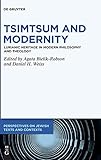Tsimtsum and Modernity : Lurianic Heritage in Modern Philosophy and Theology / ed. by Agata Bielik-Robson, Daniel H. Weiss.
Material type: TextSeries: Perspectives on Jewish Texts and Contexts ; 16Publisher: Berlin ; Boston : De Gruyter, [2020]Copyright date: ©2021Description: 1 online resource (XXIII, 447 p.)Content type:
TextSeries: Perspectives on Jewish Texts and Contexts ; 16Publisher: Berlin ; Boston : De Gruyter, [2020]Copyright date: ©2021Description: 1 online resource (XXIII, 447 p.)Content type: - 9783110684285
- 9783110684421
- 9783110684353
- 296.1/6 23
- BM610 .T75 2021eb
- online - DeGruyter
- Issued also in print.
| Item type | Current library | Call number | URL | Status | Notes | Barcode | |
|---|---|---|---|---|---|---|---|
 eBook
eBook
|
Biblioteca "Angelicum" Pont. Univ. S.Tommaso d'Aquino Nuvola online | online - DeGruyter (Browse shelf(Opens below)) | Online access | Not for loan (Accesso limitato) | Accesso per gli utenti autorizzati / Access for authorized users | (dgr)9783110684353 |
Frontmatter -- Contents -- Preface -- Introduction An Unhistorical History of Tsimtsum: A Break with Neoplatonism? -- Part 1: Tsimtsum and the Jewish Tradition -- The Midrashic Background of the Doctrine of Divine Contraction: Against Gershom Scholem on Tsimtsum -- Tsimtsum between the Bible and Philosophy: Levinas, Luria, and Genesis 1 -- Hasidic Thought and Tsimtsum’s Linguistic Turn -- Part 2: Tsimtsum and Modern Philosophy -- Tsimtsum and the Root of Finitude -- Unfolding the Enfolded: Schelling and Lurianic Kabbalah -- Tsimtsum, Lichtung, and the Leap of Bestowing Refusal: Kabbalistic and Heideggerian Metaontology in Dialogue -- Taking Space Seriously: Tehiru, Khora and the Freudian Void -- The Retreat of the Poet in Walter Benjamin’s “Two Poems of Friedrich Hölderlin” -- “The Kabbalistic Problem is not Specifically Theological”: Franz Rosenzweig on Tsimtsum -- Tsimtsum as Eclipse: Anthropomorphism and Transcendence in Buber and Horkheimer -- Part 3: Tsimtsum after the Holocaust -- Tsimtsum as the Traumnabel of Modern Jewish Philosophy: Between History and Revelation -- Tsimtsum and Political Theology in the Thought of Gershom Scholem -- ‘Abyss Calls Unto Abyss’: Tsimtsum and Kenosis in the Rupture of God-forsakenness -- Traces of Tsimtsum: Berkovits, Fackenheim, Levinas -- Transcendental Tsimtsum: Levinas’s mythology of meaning -- Derrida Denudata: Tsimtsum and the Derridean Metaphysics of Non-Presence -- Tsimtsum: Media and Arts -- Notes on the Contributors -- Index
restricted access online access with authorization star
http://purl.org/coar/access_right/c_16ec
This volume is the first-ever collection of essays devoted to the Lurianic concept of tsimtsum. It contains eighteen studies in philosophy, theology, and intellectual history, which demonstrate the historical development of this notion and its evolving meaning: from the Hebrew Bible and the classical midrashic collections, through Kabbalah, Isaac Luria himself and his disciples, up to modernity (ranging from Spinoza, Böhme, Leibniz, Newton, Schelling, and Hegel to Scholem, Rosenzweig, Heidegger, Benjamin, Adorno, Horkheimer, Levinas, Jonas, Moltmann, and Derrida).
Issued also in print.
Mode of access: Internet via World Wide Web.
In English.
Description based on online resource; title from PDF title page (publisher's Web site, viewed 28. Feb 2023)


